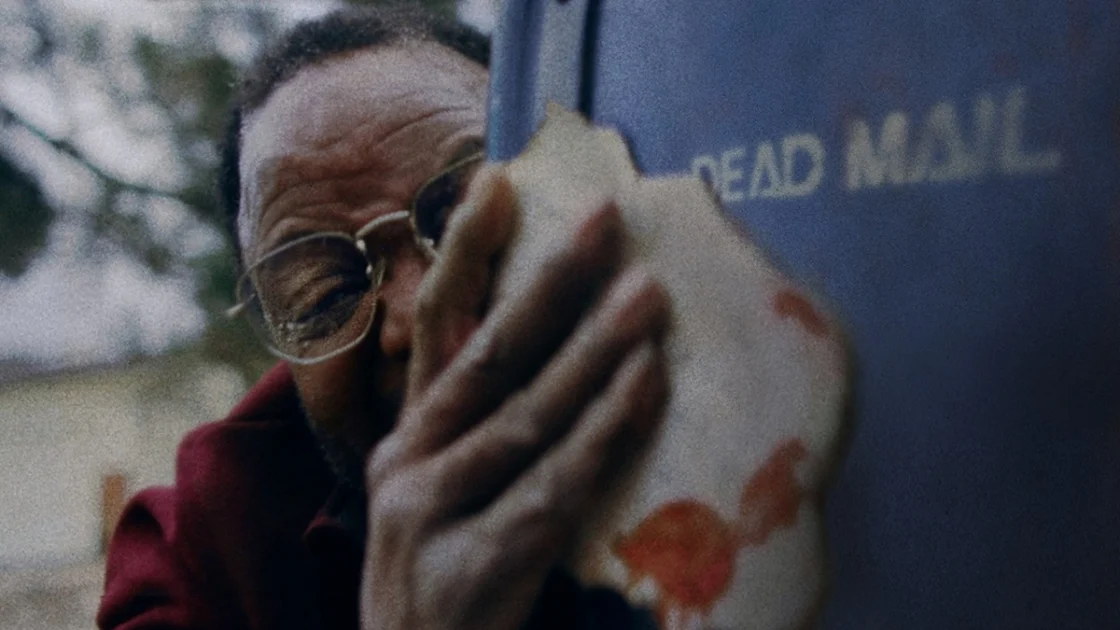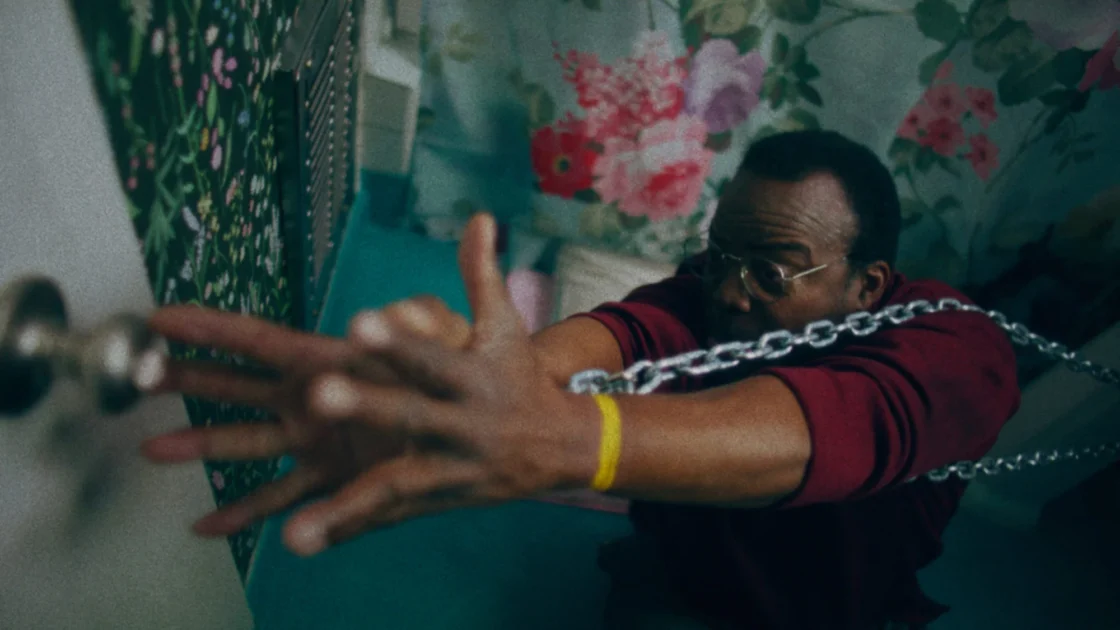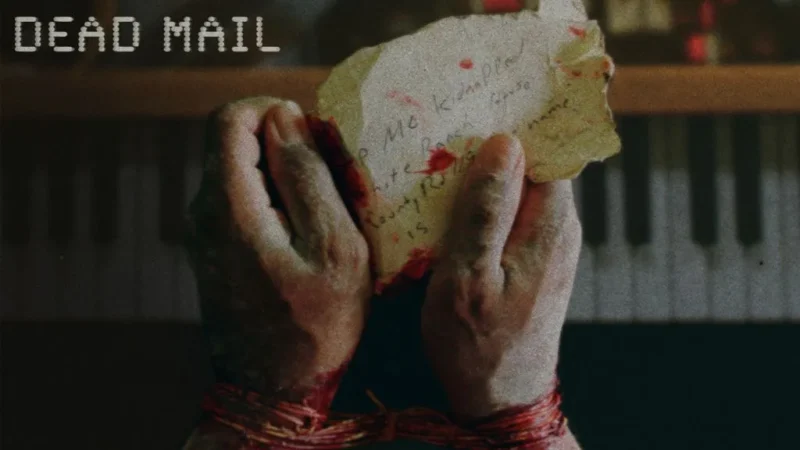Something is unnerving about films that weaponize intimacy, and “Dead Mail” handles this theme with surgical precision. This retro-tinged psychological thriller doesn’t just lean into 1980s aesthetics, it crawls inside them, emerging with something that feels both familiar and deeply unsettling. An unexpected independent horror movie gem, all your streaming options can be found later in the review.
Spoiler Warning While this review avoids major ending reveals, some scenes and aesthetic choices are discussed. The ending for Dead Mail 2025 is in a sealed section toward the end of the review. Proceed if that sounds good.
- Director: Joe DeBoer, Kyle McConaghy
- Cast: Sterling Macer Jr., John Fleck, Micki Jackson.
- Genre: Psychological Thriller
- Year: 2024, and to the internet on Shudder and AMC+ in 2025
- Distributor: Shudder
- First released at the SXSW Film Festival in 2024 on March 9th.
- Production: Alarmist Entertainment, Contact Light Films, Spooky Pictures.

The Art of Atmospheric Suffocation
The cinematography immediately establishes its credentials through deliberate visual claustrophobia. Every frame utilizes tight focal points with intentionally garbled backgrounds, creating a muffled, grainy texture that makes you feel like an unwitting voyeur. The camera work isn’t just stylistic, it’s strategic, using deliberate focus techniques while maintaining an almost documentary-like intimacy that puts us uncomfortably close to the unfolding horror.
Directors Joe DeBoer and Kyle McConaghy employ frequent low-angle shots that emphasize power dynamics, literally looking up at characters who hold control while diminishing those who’ve lost it. There’s even a brilliantly executed tracking shot following a cord up a wall into a back room, seemingly mundane details that function as breadcrumbs in this psychological maze.
The structure unfolds through disjointed revelations, beginning with two office workers discovering blood-smeared, torn paper that a man crawling across the ground had shoved into a dead letter box, gasping that he’d been kidnapped.
When Investigation Meets Obsession
Jasper Lawrence serves as our mild-mannered investigator of undeliverable mail, a postal officer who goes above and beyond tracking down lost packages. When a diamond-engraved chain surfaces in the lost items, he begins tracing ownership and stumbles upon the bloodied letter. Something about it nags him. He has the letter tested and confirms it’s real blood.
Disturbed, he asks a foreign liaison named Renée to help track down the address. Their interactions provide moments of authentic levity. Renée’s sharp retorts in what might be Czech or German feel both genuine and jarring against the mounting dread.
But Jasper is unaware he’s being watched. His investigation attracts the attention of someone dangerous, and his methodical pursuit of the truth becomes a race against time that he may not survive.
The Backwards Revelation
The narrative steps backward in time to reveal how this nightmare began. Through flashbacks, we learn that Trent Whittington is obsessed with Josh, a talented synthesizer engineer. Trent stalks him through music industry connections, positioning himself as a benefactor and collaborator.
Initially, their relationship seems genuine. Trent buys expensive parts for Josh’s inventions, visits him regularly, and shows genuine interest in his creative process. Seemingly innocuous conversations are underscored by ominous music that hints at darker intentions. Trent appears to be nursing unrequited feelings, pining over a photograph while growing increasingly despondent about rejection that Josh doesn’t even realize he’s delivering.
Trent, an older man with reclusive tendencies and a deeply nostalgic attachment to analog technology, is drawn to Josh not only for his talent and charisma but for the sense of belonging and creative rejuvenation he brings. For Trent, Josh represents a second chance at connection, artistry, and purpose, a way to recapture something he lost long ago.
The Creative Prison
In a twisted act of devotion, Trent constructs what he believes will be their shared paradise: a lavish basement studio equipped with high-end synthesizer equipment. But paradise becomes a prison when Trent reveals his true intentions. He brings Josh to the basement under false pretenses, then traps him there, demanding they create their “masterpiece” together.
The basement itself becomes a character, mostly empty except for the musical equipment and a Chinese lantern that provides dim illumination. Trent becomes the disembodied voice from above, a controlling presence that grows more desperate as his fantasy crumbles.
Trent’s obsession is rooted not in malice but in a profoundly distorted yearning for companionship. There are moments during Josh’s captivity where the film lingers on their conversations, ones that echo the early warmth of their relationship. These scenes complicate the traditional captor-victim narrative, suggesting that Trent genuinely believes he is preserving something beautiful. That belief is delusional and dangerous, but tragically human nonetheless.
As Josh’s situation deteriorates, growing a beard, going on hunger strikes, and being moved to increasingly harsh conditions, we witness the slow destruction of both captor and captive. Josh’s escape attempts only result in tighter restrictions, with Trent’s control becoming more paranoid and absolute.
Institutional Failure and Female Determination
The film’s most powerful element emerges in its portrayal of institutional indifference. When Jasper dies under suspicious circumstances, the official story frames it as a murder-suicide. But the women who initially discovered Josh’s plea for help, postal workers Ann and Bess, refuse to accept this convenient explanation.
Their determination to uncover the truth becomes the film’s emotional backbone. These aren’t trained investigators or heroic protagonists; they’re ordinary women who recognize injustice and refuse to let it stand. Their methodical investigation, aided by Renée’s foreign intelligence contacts, demonstrates how persistence and collaboration can triumph over official negligence.
The film’s final act introduces a tonal shift that feels both earned and necessary. These women push forward despite being dismissed as “emotional females,” driven by their conviction that Jasper was murdered and that someone should listen to them.
The Sound of Obsession
Throughout the film, music serves as both salvation and torment. Josh’s synthesizer work represents artistic freedom and innovation, while Trent’s obsession with preserving their collaboration becomes a form of sonic imprisonment. The contrast between organic creativity and forced production underscores the film’s central theme: that true artistry cannot be captured, only corrupted.
The tension between analog nostalgia and human exploitation runs throughout “Dead Mail.” Trent’s love for vintage equipment mirrors his desire to freeze time, to preserve moments and relationships that were never meant to be permanent. His basement studio, filled with beautiful instruments, becomes a monument to the destructive power of refusing to let go.
Conclusion and Dead Mail Verdict
“Dead Mail” succeeds because it understands that the most effective horror often comes from recognizable human emotions taken to their logical extreme. The film’s retro aesthetic never feels like empty nostalgia. Instead, it creates a world where certain behaviors could flourish unchecked, where institutions fail victims, and where artistic obsession can literally become a matter of life and death.
The performances ground the film’s more surreal elements in genuine human emotion. Sterling Macer Jr. brings quiet dignity to Jasper’s investigation, while the ensemble cast creates a believable world of flawed, complex characters navigating off-kilter circumstances.

“Your grandmother masturbates standing up.”
Quote from the film “Dead Mail” 2025
Rating: 4 poisoned mentors out of 5
Dead Mail is psychological thriller filmmaking at its most intimate and unsettling. A reminder that sometimes the most dangerous people are those who genuinely believe they’re helping you achieve your dreams. For more mentorship trauma, watch Self Help or Lucid next.
Major Spoilers: The True Ending of Dead Mail
Ending of Dead Mail Spoilers Ahead
Stop reading here if you haven’t watched the film.
Ann and Bess, the postal workers who initially found Josh’s bloody plea for help, refuse to accept the official story that Jasper’s death was a murder-suicide. Their investigation, aided by foreign contact Renée, leads them to identify Trent as the perpetrator. Ann visits Trent’s house and discovers Josh imprisoned in the basement through a floor window.
As Ann helps Josh escape, Trent appears with a hammer but chooses not to resist. In the film’s final moments, Trent consumes poisoned food he had originally prepared to kill Josh; the same poison meant to be Josh’s final meal becomes Trent’s suicide. His death is not a redemptive choice but the collapse of a man whose obsession destroyed everything he claimed to love. Josh escapes with his instruments and his life, while Trent dies listening to the music Josh created under captivity, the “masterpiece” now forever tainted by its origins.
Ann and Bess, the postal workers who initially found Josh’s bloody plea for help, refuse to accept the official story that Jasper’s death was a murder-suicide. Their investigation, aided by foreign contact Renée, leads them to identify Trent as the perpetrator. Ann visits Trent’s house and discovers Josh imprisoned in the basement through a floor window.
As Ann helps Josh escape, Trent appears with a hammer but chooses not to resist. In the film’s final moments, Trent consumes poisoned food he had originally prepared to kill Josh; the same poison meant to be Josh’s final meal becomes Trent’s suicide. His death is not a redemptive choice but the collapse of a man whose obsession destroyed everything he claimed to love.
Josh escapes with his instruments and his life, while Trent dies listening to the music Josh created under captivity, the “masterpiece” now forever tainted by its origins. The film ends not with justice served through proper channels, but with ordinary people taking extraordinary action to save a life that institutions had already written off.

